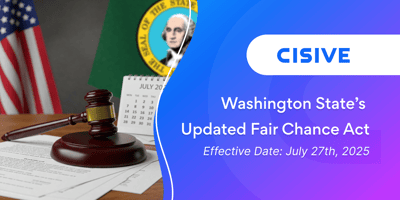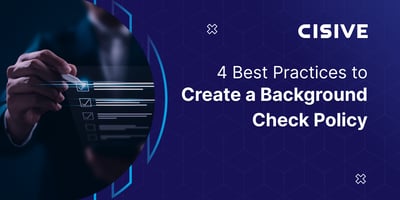

Beginning July 27, 2025, Washington State will implement a newly revised Fair Chance Act, expanding...

You've probably felt the pressure to hire quickly. At the same time, you’re managing interviews, paperwork, and deadlines. When you're in a rush, it's easy to miss details, and those missed details can turn into compliance issues.
Forgetting to sign a form, using the wrong language in a job post, or skipping a required step can all lead to trouble. What seems small now could trigger audits, fines, or legal claims down the line.
Hiring compliance gives you a way to stay ahead of those risks. When you know what rules apply at each stage, you protect your company and build better hiring habits. Clear procedures help you manage background checks, candidate records, and interview steps. With the right process in place, you stay organized and avoid costly mistakes.
Below, we look at hiring compliance essentials that keep your company aligned with industry standards and government regulations. That way, you hire with fewer problems and keep your company safe from penalties.
Key TakeawaysHere are the key things you need to know about hiring compliance:
|
Hiring compliance is the act of following industry standards and regulations as you recruit, interview, and hire people.
Being in compliance with your hiring practices means that you’re following the laws and regulations set by the government. It sets the standards for how you post jobs, interact with candidates, and extend employment offers. You’re responsible for meeting those standards every step of the way.
Your compliance processes define how you follow the law throughout the hiring process. A clear understanding of what compliance covers helps you hire confidently, avoid missteps, and create fair, consistent practices from start to finish.
Hiring compliance covers several core areas you need to manage throughout the hiring process. Here is how compliance looks at each step:
Job postings must follow equal opportunity rules.
Applications require secure handling and proper storage.
Interview questions must meet legal and ethical standards.
Background checks must comply with all screening laws.
Offer letters must reflect accurate and lawful terms.
Onboarding forms must be completed within the required timeframes.
One misstep in your hiring or onboarding process may lead to penalties or trigger an investigation into your company’s practices. Staying within the guidelines while securing job candidates helps you stay on track. When you apply the rules consistently, you protect the company and make better hiring decisions.
Several federal and state agencies regulate hiring compliance, each with its own area of oversight. These organizations create and enforce the rules that guide how you hire. Their role is crucial because they hold employers accountable. Without oversight, hiring practices could easily become inconsistent or unfair.
Two of the most important staffing compliance organizations include:
The Equal Employment Opportunity Commission enforces workplace discrimination laws. It regulates hiring practices that involve protected categories such as race, sex, religion, and age.
The agency reviews claims, conducts investigations, and interprets the law for employers. It also publishes guidance that helps you apply legal standards to your hiring process.
As an HR professional, you rely on the EEOC to clarify what is allowed during the hiring process. Its rules shape how you structure job postings and manage each step of hiring. Compliance with EEOC guidance helps you protect both your company and the integrity of your hiring practices.
The Office of Federal Contract Compliance Programs is a division of the U.S. Department of Labor. It oversees hiring practices if your business works with the federal government. You are expected to support equal opportunity and show evidence that your hiring process meets federal standards.
The OFCCP affects how you track applicants and how you document your outreach. You may need to prepare written affirmative action plans. You might also submit reports that show how you meet your obligations. These expectations require structure and accountability.
If your company falls under OFCCP authority, compliance becomes part of your agreement. It ties directly to how you maintain that contract.
When it comes to compliance, due diligence is your responsibility at each stage of the hiring process. A small oversight can lead to legal exposure or damage your company’s reputation. When you follow clear rules, you build a hiring system that protects your organization and supports fair hiring practices.
Here are six reasons why hiring compliance and documented hiring processes are critical to your role and your organization:
Legal risk decreases when each hiring step follows required procedures.
Updates to local and federal laws become easier to apply when you have a clear, defined process.
Candidates receive fair treatment through consistent evaluation standards.
Documentation stays organized, which supports accountability during reviews.
Compliance reports become easier to complete when the groundwork is already in place.
A clear hiring structure builds trust with job seekers and internal teams.
When compliance standards are built into your hiring process, you have more control over outcomes that affect your entire workforce. It gives you a clear path to follow and removes uncertainty from your daily decisions. You also create a hiring environment that reflects how your organization grows and operates.

Hiring laws bring structure to decisions that can carry long-term consequences. Each one shapes a specific part of your process and sets clear expectations for how you manage it.
Remember: Legal standards are not static. Employment law updates and evolves, and you are expected to keep pace.
Below are some common hiring compliance laws that apply to almost any industry you work in:
The Americans with Disabilities Act requires you to provide equal access to applicants with disabilities. That includes how you post jobs, conduct interviews, and evaluate qualifications.
The law applies even before the hiring decision is made. Your process must remove barriers that prevent someone from applying or participating fully. You may need to adjust how you communicate or where interviews take place. Building ADA compliance into each step helps you avoid conflict and shows your commitment to equal opportunity.
Failing to comply with the ADA can result in complaints, lawsuits, or investigations. You may also damage your reputation and lose qualified candidates who feel excluded. If your hiring process cannot show that accommodations were considered, you risk being held accountable.
The Fair Credit Reporting Act governs how you use background checks during hiring. If you rely on third-party reports to evaluate candidates, you must follow specific steps. These steps include:
Getting written consent for the check.
Providing a clear disclosure.
Giving applicants a chance to respond if you plan to take adverse action.
The law protects candidates from unfair or unapproved use of their information. Ignoring FCRA requirements can lead to legal claims, financial penalties, and damage to your hiring process. You may be sued for failing to notify a candidate properly or for denying employment without giving them a copy of the report.
Including FCRA guidelines in your compliance best practices helps you stay consistent and avoid mistakes that could put your company at risk.
The Equal Pay Act requires you to offer equal compensation to men and women who perform jobs with similar skill, effort, and responsibility under the same conditions. During hiring, that means your salary offers must reflect the role, not the candidate’s gender. You also need to avoid relying on past pay history if it reinforces wage gaps.
Noncompliance with the Equal Pay Act can lead to lawsuits, government investigations, and financial penalties. A candidate who discovers a pay discrepancy may file a claim that forces you to defend your decision-making process.
When you establish clear compensation standards from the start, you reduce the risk of wage discrimination and show that your hiring process treats every applicant fairly.
Title VII prohibits you from making employment decisions based on race, color, religion, sex, or national origin. It applies to every step of your hiring process, including job postings, interviews, and final decisions.
You’re expected to give each applicant fair consideration without bias or preference tied to protected characteristics. You must document your decisions and apply the same standards to every applicant.
The law also covers harassment and retaliation during recruitment and hiring. Retaliation is when you, the employer, take action against someone in response to a request or complaint of theirs. Protect yourself against claims of retaliation by making sure your process includes documentation about every hiring decision you make.
Failing to follow Title VII can lead to EEOC complaints, lawsuits, and reputational harm. If a candidate believes they were excluded based on a protected category, you may be asked to defend your actions. A structured, consistent process helps protect your company and supports equal opportunity.
The ADEA protects individuals age 40 and older from discrimination during the hiring process. That means you cannot base decisions on assumptions about age, retirement plans, or perceived limitations.
Language in job postings that suggests a preference for younger candidates may also put your company at risk. Your evaluations must focus on qualifications and experience, not age. Avoid asking age-related questions and focus on job-related criteria.
Noncompliance with the ADEA can result in legal claims, investigations, and public exposure of discriminatory practices. If you exclude older applicants or treat them differently, you may have to justify every part of your process. Clear documentation and consistent standards help you avoid claims tied to age discrimination.
Background screening services like Cisive give you a reliable way to vet candidates while meeting legal requirements. You don’t have time to track every detail across shifting regulations. Cisive helps you manage background checks with clear steps that reduce risk.
By using our proven platform, you stay aligned with hiring compliance standards and avoid mistakes that could lead to legal or reputational trouble.
Here are six reasons why HR managers and employers use Cisive to stay compliant:
Offers built-in support for FCRA and EEOC requirements.
Provides clear, accurate disclosures and consent tools.
Delivers updates on state and federal screening laws.
Maintains strict data security and privacy protocols.
Includes detailed audit trails for every background check.
Helps you document decisions with easy-to-access reporting tools.
Cisive helps you apply legal standards at each step when navigating background screening. Our system creates a documented path from disclosure to final decision. You reduce the risk of skipping a required step or misapplying a rule.
If your hiring decision or process is reviewed, you can point to records that confirm that you followed legal and policy requirements.
Staying compliant during hiring starts with having the right tools in place. Cisive gives you a structured way to manage background checks, apply legal standards, and document every step. You reduce risk by following a process built for accuracy and accountability.
If you want a screening partner that promotes hiring compliance at every stage of your recruiting and onboarding process, reach out to Cisive to schedule a consultation or get a free demo.
Author: Michael Kendrick
Bio: Senior Manager of Corporate Compliance at Cisive.
Let's Connect on LinkedIn
Beginning July 27, 2025, Washington State will implement a newly revised Fair Chance Act, expanding...

Expanding your business internationally can be a great growth opportunity, but it comes with the...

As an HR or talent management pro, you know background checks are valuable in protecting your...